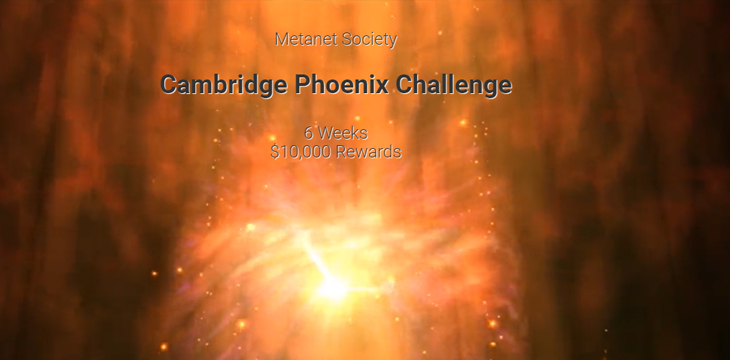|
Getting your Trinity Audio player ready...
|
The Cambridge University Metanet Society recently announced the winners of its Phoenix Challenge, an international Bitcoin SV (BSV) coding competition. At a time when many people around the world are stuck inside due to coronavirus, the Phoenix challenge allowed software developers around the world to create.
“Extraordinary times can yield extraordinary projects as we last saw in the 2008 financial crisis,” Robin Kohze, the founder of the Cambridge University Metanet Society, told CoinGeek.
Whereas many other Cambridge Societies reduced their activities, we saw the chance and duty to fill an increasing void of drive and creativity by starting this 6-week coding competition. On the surface, coding competitions seem to be head-to-head races of those already well experienced in the field. [But] looking closer, I see all the previously inexperienced enthusiasts starting to apply newly learned skills that for some might even turn into a lifelong passion and career.
While many societies at Cambridge have been forced to scale back on their activity given the COVID-19 pandemic, the Metanet Society saw that coronavirus allowed them to stay very productive. The Phoenix challenge not only inspired existing BSV developers to participate, but it also attracted BSV newcomers and gave them hands-on experience using the Bitcoin protocol.
The winners
The Phoenix Challenge ran for six weeks and had a $10,000 prize pool. The judges were prepared to give out a maximum of 30 $150 prizes, and to divide the remaining $5,500 among the first, second, and third place winners—$3,000, $1,500, and $1,000 respectively.
The first place went to Baemail, the inverse spam email client that gives users a way to send and receive messages between paymails. Taking home the second place is MetaID, a distributed identity protocol that allows for the organization of data between different applications/wallets on BSV networks; while the third place went to Gemscape, a platform that pays users for providing feedback.
It's time to announce the Phoenix-Challenge Winners!
Explore all entries at https://t.co/kb3MpZwvhI pic.twitter.com/5TOCb7mSbG— MetanetSociety (@MetanetSociety) May 10, 2020
Baemail was awarded $3,450 for coming in first place, MetaID was awarded $1,950 for coming in second, and Gemscape was awarded $1,550 for coming in third.
“The main prize winners Baemail, MetaID and Gemscape were certainly highlights of the competition due to their already more advanced development state and well-defined business case,” said Kohze. “[But] I personally always look at just recently started projects that utilize the technological potential we have after the Genesis update, [I] also acknowledge that more sophisticated projects can hardly be written within days. To specifically support those [recently started] projects, we decided to grant 5 [$650] innovation awards to support further research and development of those projects.
“Baemail, MetaID, and Gemscape stood out because they were further along in terms of development than newer, recently started projects. However, the judges saw many promising submissions and awarded them innovation grants so that their teams could further research and build those projects. The five winners of the innovation grants were:
• SLictionary, a crowdsourced dictionary.
• Datum, a BSV-based platform to store and share data for a fee.
• Pub$ub, a platform for earning Bitcoin by publishing streams of data.
• MapSV, a tilemap on the blockchain, and
• Hilarist, a BSV-app that competes with Comedy Central, iTunes, Netflix, and YouTube for supremacy in a single category–comedy.
The judges also gave out two $150 excellence awards to RouteSV, a site where you can upload and edit text, images, and GPS, and Meta.Salon, a marketplace for digital art.
Tips for hackathon success
We’d like to congratulate all of the winners of the Phoenix Challenge, as well as thank the Cambridge Metanet Society and the Phoenix Challenge judges for investing their time and energy to make this coding competition a success.
If you missed out on the Phoenix Challenge, don’t sweat it, there will be more BSV hackathons and coding competitions in the future!
When we asked Kohze what advice he would give individuals looking to participate in similar challenges or hackathons in the future, he said:
Mastering the basic programming frameworks is probably most important (and most underestimated) in every hackathon. While well thought-out ideas can get one quite far, hackathons are mostly won by having a prototype that can showcase the potential of that idea in real life. Some ideas sound interesting but turn out to be extremely difficult to implement—building usable prototypes with a certain degree of professionalism sets apart the teams that win from those that keep trying.
Kohze added, “That being said, it only takes a week or two of focused learning to get to know the basic tools and is thus achievable for every enthusiast in the space. In recent hackathons, the winners mostly used a combination of Javascript + React.js as [the] main programming framework and the Bitcoin SV Planaria & BSV.js libraries to interact with the blockchain due to their robustness and ease to create interactive applications.”

 02-25-2026
02-25-2026 




